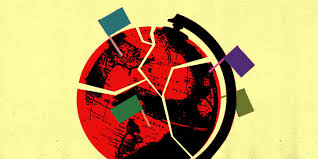Nationalism denies us the ability to tackle our biggest challenges. It robs us of the chance to work together to solve big, daunting issues that affect everyone, and which can only be tackled collaboratively. Now, especially, when we’ve raised our “energy potential” to a level undreamt of by our ancestors. For the first time, the specter of an existential threat to our civilization reveals itself in the cumulative effects of human action. And when the impact is global, only a global approach to finding solutions will work.
Here at CCA, it is our hope that recent world events with COVID-19 will push us to start moving back to an era of international cooperation and collaboration.
The concept of ‘every nation looking out for itself’ will kill us. One country acting on its own cannot solve the problems of climate change, the staggering, unprecedented loss of biodiversity, or the accelerating problem of our oceans filling up with plastic. All of these are well underway, and there is no question about whether we’ll need to get a handle on them, and soon. Furthermore, no one country can successfully isolate itself from the effects of these things elsewhere in the world.
Our reach is global, and our effect on the web of life is universal.
We are not advocating against the concept of patriotism, or loving your country. Be proud of your country and its achievements. Defend it. Advocate for public policies that make it better, more humane, more compassionate. But that is not the same as believing your country can best achieve success by focusing on itself, to the exclusion of the rest of the world. The quality of life in other countries does in fact impact the quality in yours. We may not be able to raise up the rest of the world by ourselves, but we most certainly can work together, to the extent that circumstances allow.
We should raise our children to be citizens of the world. As Canadians, in our case, we cannot look after interests that are Canada’s alone and expect to survive on our own. Yes, there are problems we can take care of locally. The plight of the SRKWs, who need a restoration of the salmon stocks they rely on, (there is an international boundary involved in this one, and two-state co-operation will be involved, but it’s still essentially a local problem). Finding a way to end the slaughter of thousands of narwhales and belugas in Canada’s north is one that lands squarely on us, and is a legacy issue not unrelated to our colonialist past. The ghost gear floating off our shores needs to be cleaned up unless we want to lose even more marine life to this dangerous debris. Whether we allow seismic blasting to explore for oil deposits, or drilling in sensitive marine areas is on us.
With the example of discarded fishing gear though, we start moving into issues of a more international scope. The Global Ghost Gear Initiative (GGGI), as it’s name suggests, is a worldwide endeavor designed to speed the development of solutions, allowing all nations to benefit from their participation, but in theory Canada could go it alone to try to clean up this problem along its own shores.
But then there are issues where one nation’s efforts (any nation’s, regardless of size or population) pale into insignificance relative to the size of the problem. When it comes to climate change, we will all prosper or perish together. The immediate effects are being felt more in some areas of the globe than others, but ultimately the threat is against all, equally. It’s the same with loss of biodiversity. If the last Vaquita dies, it really doesn’t make much difference whether you live in Mexico, or Canada, or Australia. The world will have lost something of incalculable value, and no one anywhere is going to be able bring it back.
With plastic pollution, it doesn’t make much difference whether a piece of debris entered the Pacific eco-system from our shores, or from Anchorage, Manila or Hanoi. Especially when it comes to the frightful rate of accumulation of micro plastics in our water and sea life, the issue impacts all of us in terrible ways. Furthermore, the solutions to this problem cannot come from one country acting alone.
Nationalism is a terrible idea, and it is dangerous. It’s a notion usually foisted upon us by wannabe dictators who hope and expect to profit from a breakdown in the international order, and who don’t want to be constrained by the necessities of cooperation with their contemporaries abroad. Nationalism should be another of those many ideas we’ve tried and discarded on the scrap heap of history. It’s perpetuation would not only be unwise, when it comes to issues like climate change and biodiversity, it could kill us.
For The Orca’s Voice,
The Canadian Cetacean Alliance Team



Leave a Reply